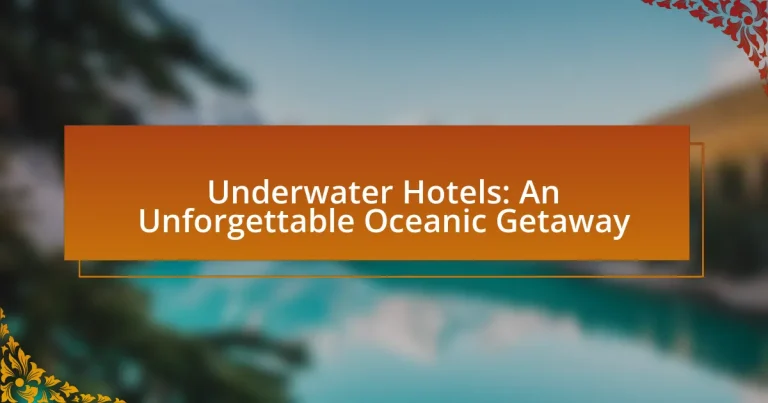Underwater hotels are unique accommodations situated beneath the ocean’s surface, providing guests with panoramic views of marine life and luxurious amenities. This article explores the distinct features of underwater hotels, including their architectural design, safety measures, and sustainability practices. It also examines the growing popularity of these hotels, the types available, and the experiences they offer, from luxury to budget options. Additionally, the article highlights notable underwater hotels worldwide and discusses the challenges they face, such as environmental impact and structural integrity, while emphasizing the technological advancements that enhance guest experiences.
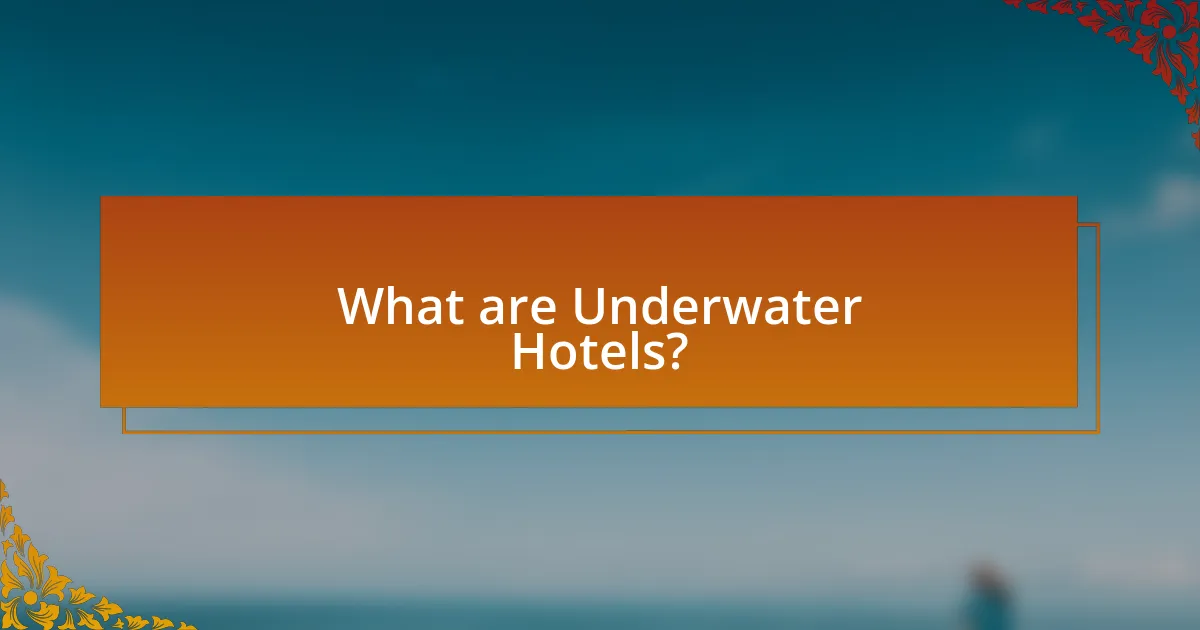
What are Underwater Hotels?
Underwater hotels are unique accommodations located beneath the surface of the water, offering guests panoramic views of marine life and underwater ecosystems. These hotels are designed with large glass walls or windows, allowing visitors to experience the ocean environment while enjoying luxury amenities. The concept of underwater hotels has gained popularity since the first such establishment, the Jules’ Undersea Lodge, opened in 1986 in Key Largo, Florida. Today, various underwater hotels exist around the world, such as the Conrad Maldives Rangali Island and the Poseidon Undersea Resort, showcasing innovative architecture and sustainable practices to enhance the guest experience while minimizing environmental impact.
How do Underwater Hotels differ from traditional hotels?
Underwater hotels differ from traditional hotels primarily in their unique location and design, as they are submerged beneath the ocean’s surface, offering guests panoramic views of marine life. This distinct setting creates an immersive experience that traditional hotels cannot replicate, as they typically reside on land and lack direct underwater access. For instance, the Poseidon Undersea Resort in Fiji features rooms with glass walls that provide unobstructed views of the ocean, showcasing the vibrant underwater ecosystem, which is a feature not found in conventional accommodations.
What unique features do Underwater Hotels offer?
Underwater hotels offer unique features such as panoramic underwater views, immersive marine life experiences, and luxurious accommodations designed to withstand oceanic pressures. These hotels often include large glass walls that provide guests with 360-degree views of the surrounding aquatic environment, allowing for direct observation of fish and other sea creatures. Additionally, many underwater hotels incorporate advanced technology for comfort and safety, such as air filtration systems and soundproofing to enhance the guest experience. The combination of these features creates a distinctive and memorable stay that is unlike any traditional hotel experience.
How is the architecture of Underwater Hotels designed?
The architecture of underwater hotels is designed to withstand high water pressure and provide a safe, comfortable environment for guests. This involves using reinforced materials such as acrylic and concrete, which can endure the stresses of being submerged. Additionally, the design often incorporates large panoramic windows to offer stunning underwater views while ensuring structural integrity. For instance, the Poseidon Undersea Resort utilizes a modular construction approach, allowing for flexibility in design and ease of assembly underwater. These architectural choices are crucial for ensuring the longevity and safety of the hotel while enhancing the guest experience.
Why are Underwater Hotels becoming popular?
Underwater hotels are becoming popular due to their unique and immersive experience that allows guests to stay submerged in marine environments. This novelty attracts travelers seeking adventure and a connection with nature, as they can observe marine life through large windows while enjoying luxury accommodations. The growing trend is also supported by advancements in technology and design, which enhance safety and comfort, making underwater stays more accessible and appealing. Additionally, the rise of eco-tourism has led to increased interest in sustainable travel options, with underwater hotels often promoting conservation efforts and providing educational experiences about ocean ecosystems.
What experiences do guests seek in Underwater Hotels?
Guests seek immersive marine experiences in underwater hotels, including breathtaking views of aquatic life and unique accommodations. These hotels provide opportunities for guests to observe diverse marine ecosystems through large windows, enhancing their connection to the ocean. Additionally, guests often look for luxury amenities, such as fine dining with ocean views, spa services, and personalized experiences that cater to their preferences. The novelty of sleeping beneath the waves and the tranquility of the underwater environment further contribute to the allure of these destinations, making them a sought-after choice for travelers looking for unforgettable experiences.
How do Underwater Hotels contribute to eco-tourism?
Underwater hotels contribute to eco-tourism by promoting marine conservation and providing unique educational experiences about ocean ecosystems. These hotels often incorporate sustainable practices, such as using renewable energy sources and minimizing waste, which align with eco-tourism principles. For instance, the Poseidon Underwater Resort in Fiji features a coral restoration program that helps rehabilitate local marine habitats, demonstrating a commitment to environmental stewardship. Additionally, underwater hotels attract tourists who are interested in marine life, thereby generating funding for conservation efforts and raising awareness about the importance of protecting ocean environments.
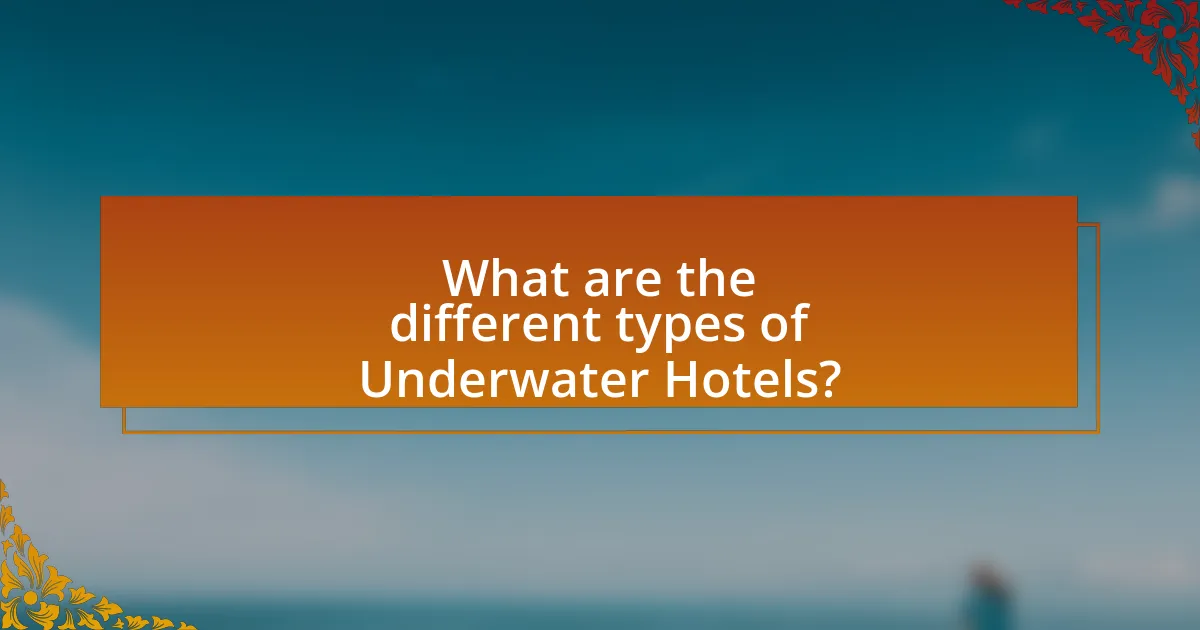
What are the different types of Underwater Hotels?
There are several types of underwater hotels, including fully submerged hotels, semi-submerged hotels, and underwater suites within larger resorts. Fully submerged hotels, such as the Poseidon Undersea Resort in Fiji, offer guests an immersive underwater experience with rooms located entirely below the ocean surface. Semi-submerged hotels, like the Jules’ Undersea Lodge in Florida, provide access to underwater accommodations while still allowing for above-water amenities. Underwater suites, found in resorts like the Conrad Maldives Rangali Island, feature rooms that are partially submerged, allowing guests to enjoy ocean views while having access to land-based facilities. Each type offers unique experiences and varying levels of interaction with marine life.
How do luxury Underwater Hotels compare to budget options?
Luxury underwater hotels offer unparalleled experiences, featuring high-end amenities, exquisite design, and unique underwater views, while budget options typically provide basic accommodations with limited services and views. Luxury establishments often include fine dining, spa services, and personalized experiences, attracting affluent travelers seeking exclusivity. In contrast, budget underwater hotels focus on affordability, often sacrificing luxury features for cost-effectiveness, appealing to a broader audience. For instance, luxury underwater hotels like the Conrad Maldives Rangali Island provide underwater dining and private villas, whereas budget options may offer simpler rooms with basic underwater views. This distinction highlights the significant differences in guest experience, service quality, and overall value between luxury and budget underwater hotels.
What amenities are typically found in luxury Underwater Hotels?
Luxury underwater hotels typically feature amenities such as panoramic underwater views, private balconies, and high-end dining options. These hotels often include spacious suites with floor-to-ceiling windows for optimal marine life observation, advanced climate control systems, and luxurious furnishings. Additionally, many offer spa services, fitness centers, and direct access to underwater activities like snorkeling and diving. Some establishments provide personalized butler services and exclusive excursions, enhancing the overall guest experience. The integration of cutting-edge technology, such as smart room controls and high-speed internet, further elevates the luxury experience.
What can budget travelers expect from Underwater Hotels?
Budget travelers can expect unique experiences and affordable options at underwater hotels, which often feature basic amenities and stunning underwater views. Many underwater hotels offer packages that include meals and activities, making them accessible to those on a budget. For instance, the Jules’ Undersea Lodge in Florida provides a relatively low-cost option for an underwater stay, with rates starting around $800 for a night, which includes meals and diving experiences. This pricing is competitive compared to luxury accommodations, allowing budget-conscious travelers to enjoy an extraordinary oceanic getaway without overspending.
What are some notable Underwater Hotels around the world?
Some notable underwater hotels around the world include the Conrad Maldives Rangali Island, which features an underwater suite called The Muraka, offering panoramic views of marine life. Another example is the Jules’ Undersea Lodge in Florida, known for being the first underwater hotel, where guests must scuba dive to access their rooms. Additionally, the Poseidon Undersea Resort in Fiji is designed to provide luxury accommodations 40 feet below the ocean’s surface, featuring underwater dining and a unique underwater spa. These hotels exemplify innovative architecture and immersive experiences in marine environments.
What makes each of these Underwater Hotels unique?
Each underwater hotel is unique due to its distinct architectural design, location, and immersive experiences. For instance, the Poseidon Underwater Resort in Fiji features luxurious suites with panoramic views of marine life, while the Ithaa Undersea Restaurant in the Maldives offers a dining experience surrounded by coral gardens. Additionally, the Conrad Maldives Rangali Island boasts an underwater villa that combines luxury with a unique underwater living experience, showcasing the beauty of the ocean. These features not only enhance the guest experience but also highlight the innovative approaches to underwater hospitality.
How do location and environment influence the experience at these hotels?
Location and environment significantly enhance the experience at underwater hotels by providing unique views and immersive marine interactions. The proximity to vibrant coral reefs and diverse marine life allows guests to observe underwater ecosystems directly from their rooms, creating a sense of connection with nature. For instance, hotels situated in areas with rich biodiversity, such as the Maldives or Bora Bora, offer guests the opportunity to see species like manta rays and tropical fish, which can elevate the overall enjoyment and satisfaction of their stay. Additionally, the tranquil underwater setting contributes to a serene atmosphere, promoting relaxation and a sense of escape from everyday life.
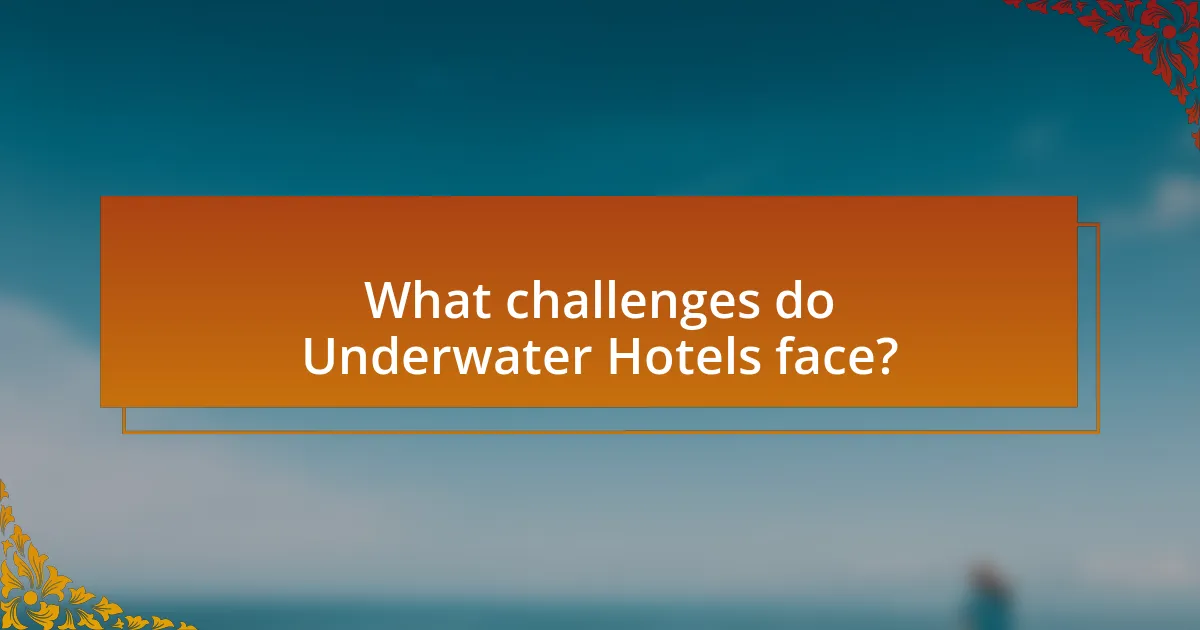
What challenges do Underwater Hotels face?
Underwater hotels face significant challenges, primarily related to structural integrity, safety, and environmental impact. The pressure of deep water necessitates advanced engineering to prevent leaks and ensure the safety of guests, as evidenced by the need for reinforced materials and specialized construction techniques. Additionally, the risk of flooding and potential natural disasters, such as tsunamis, poses a constant threat to these establishments. Environmental concerns also arise, as underwater hotels can disrupt marine ecosystems, requiring careful planning and adherence to regulations to minimize ecological damage.
How do environmental factors impact Underwater Hotels?
Environmental factors significantly impact underwater hotels by influencing their structural integrity, operational sustainability, and guest experience. For instance, water pressure at varying depths necessitates robust engineering to ensure safety and durability, as seen in the design of the Poseidon Undersea Resort, which is built to withstand pressures at 40 feet below sea level. Additionally, marine life and water quality affect the aesthetic appeal and health of the environment surrounding these hotels; for example, coral reef degradation can diminish the visual experience for guests and impact local biodiversity. Furthermore, climate change poses risks such as rising sea levels and increased storm intensity, which can threaten the viability of underwater hotels, as highlighted by the vulnerability of coastal structures in areas like the Maldives.
What measures are taken to ensure safety in Underwater Hotels?
Underwater hotels implement several safety measures to ensure guest security and structural integrity. These measures include reinforced glass and materials designed to withstand high water pressure, ensuring that the hotel can endure the underwater environment. Additionally, advanced monitoring systems are installed to detect any structural weaknesses or leaks, allowing for immediate response to potential issues. Emergency protocols, such as evacuation routes and life support systems, are established to ensure guest safety in case of emergencies. Regular maintenance checks and adherence to strict building codes further enhance safety, as evidenced by the successful operation of existing underwater hotels like the Poseidon Undersea Resort, which has been designed to meet rigorous safety standards.
How do Underwater Hotels address sustainability concerns?
Underwater hotels address sustainability concerns by incorporating eco-friendly design and operational practices that minimize environmental impact. These hotels often utilize renewable energy sources, such as solar and wind power, to reduce reliance on fossil fuels. Additionally, many underwater hotels are constructed using sustainable materials and technologies that promote energy efficiency and reduce waste. For instance, some establishments implement advanced water filtration systems to maintain marine ecosystems and utilize local resources to support the surrounding environment. These practices not only help preserve marine life but also enhance the overall guest experience by promoting awareness of ocean conservation.
What technological advancements support Underwater Hotels?
Technological advancements that support underwater hotels include advanced structural engineering, pressure-resistant materials, and sophisticated life support systems. These innovations enable the construction of safe and habitable spaces beneath the ocean surface. For instance, the use of reinforced glass and composite materials allows for large panoramic windows that withstand high underwater pressure while providing stunning views. Additionally, life support systems, including oxygen generation and water filtration technologies, ensure a sustainable environment for guests. The integration of renewable energy sources, such as tidal and solar power, further enhances the operational efficiency of these hotels, making them viable for long-term use.
How does technology enhance the guest experience in Underwater Hotels?
Technology enhances the guest experience in underwater hotels by providing immersive environments, advanced amenities, and seamless connectivity. For instance, large panoramic windows equipped with high-definition displays allow guests to observe marine life in real-time, creating a unique underwater experience. Additionally, smart room controls enable guests to adjust lighting, temperature, and entertainment systems through mobile devices or voice commands, ensuring personalized comfort. Furthermore, high-speed internet access allows for uninterrupted communication and entertainment, which is crucial for modern travelers. These technological advancements not only elevate the overall experience but also contribute to the safety and convenience of guests in these unique accommodations.
What innovations are being developed for future Underwater Hotels?
Innovations being developed for future underwater hotels include advanced structural designs utilizing transparent materials for panoramic views, enhanced energy efficiency through renewable energy sources, and smart technology integration for guest comfort and safety. For instance, architects are exploring the use of acrylic and reinforced glass to create immersive underwater experiences while ensuring structural integrity. Additionally, energy systems powered by solar panels and tidal energy are being implemented to minimize environmental impact. Smart technology, such as automated climate control and personalized guest services through mobile applications, is also being integrated to enhance the overall experience. These innovations aim to create sustainable, luxurious, and unique underwater accommodations.
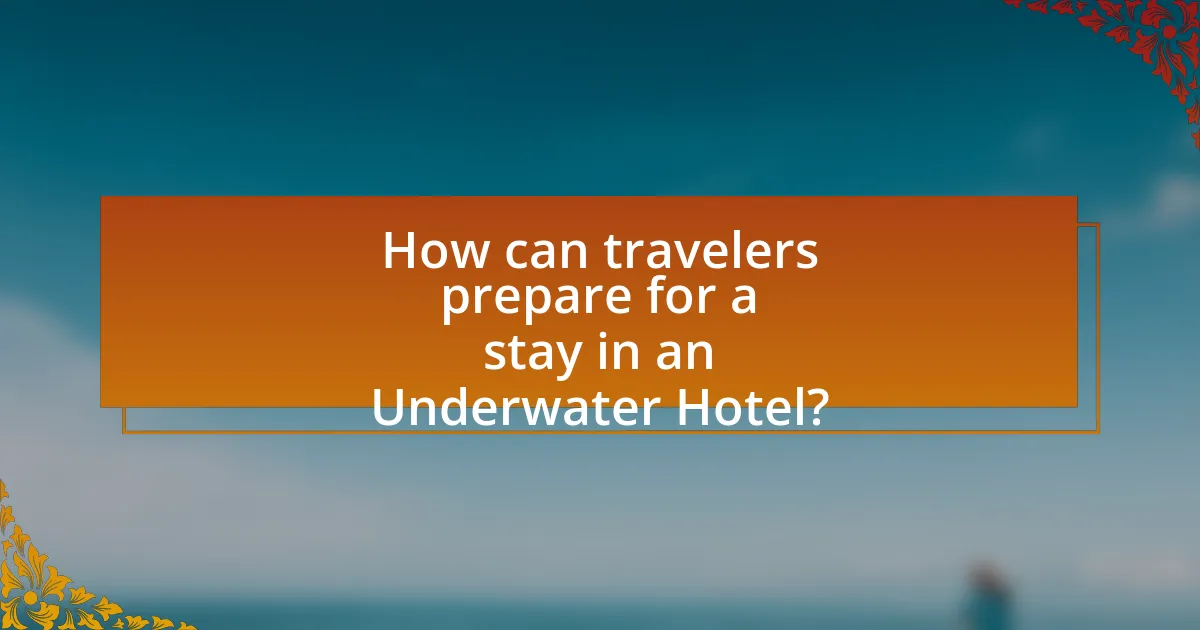
How can travelers prepare for a stay in an Underwater Hotel?
Travelers can prepare for a stay in an underwater hotel by researching the specific hotel’s amenities, understanding the unique environment, and packing appropriately. Researching the hotel allows travelers to know what to expect regarding room features, dining options, and activities available. Understanding the underwater environment is crucial, as it may involve acclimatization to lower light levels and potential motion from ocean currents. Packing should include essentials like swimwear, waterproof bags for personal items, and any necessary medications, as some underwater hotels may have limited access to medical facilities.
What should guests consider before booking an Underwater Hotel?
Guests should consider the safety and structural integrity of the underwater hotel before booking. Underwater hotels are designed to withstand water pressure and environmental conditions, but guests should verify the hotel’s compliance with safety regulations and its history of maintenance. Additionally, guests should assess the accessibility of the hotel, including transportation options and proximity to emergency services, as well as the availability of amenities such as dining and recreational activities. Understanding the potential for sea life interactions and the overall experience offered by the hotel can also enhance the stay.
How can travelers ensure a comfortable stay in an Underwater Hotel?
Travelers can ensure a comfortable stay in an underwater hotel by selecting accommodations that prioritize soundproofing, temperature control, and quality amenities. Soundproofing is essential as it minimizes noise from water currents and marine life, enhancing relaxation. Temperature control is crucial for maintaining a pleasant environment, as underwater conditions can vary. Quality amenities, such as comfortable bedding, spacious layouts, and access to dining options, contribute significantly to overall comfort. Research indicates that hotels with these features receive higher guest satisfaction ratings, confirming their importance for a pleasant underwater experience.
What are the best practices for enjoying the underwater experience?
To enjoy the underwater experience, prioritize safety, comfort, and environmental respect. Safety measures include ensuring proper training in diving or snorkeling, using reliable equipment, and adhering to guidelines provided by professionals. Comfort can be enhanced by selecting appropriate attire, such as wetsuits or swimsuits, and ensuring that you are well-hydrated and rested before the experience. Environmental respect involves avoiding touching marine life, not disturbing habitats, and following local regulations to protect the underwater ecosystem. These practices contribute to a more enjoyable and responsible underwater adventure.
